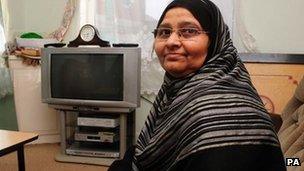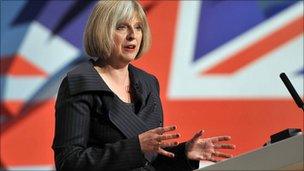English tests for immigrant spouses fair, court rules
- Published

Rashida Chapti wants her husband to come and join her in the UK
The High Court has dismissed a challenge to laws that require immigrant spouses to be able to speak English in order to live in the UK.
Three couples had challenged the rules which were introduced in November 2010.
But Mr Justice Beatson ruled the new language test was not a disproportionate interference with the couples' right to family life.
The Joint Council for the Welfare of Immigrants said the ruling would affect many UK citizens.
But Immigration Minister Damian Green said: "We believe it is entirely reasonable that someone intending to live in the UK should understand English, so that they can integrate and participate fully in our society.
"We are very pleased that the courts agree with us."
Cost of translators
The Home Office, which had also cited the costs of translators and interpreters for the NHS and other public services, now requires anyone entering the UK to join their spouse to speak a minimum level of English.
Earlier this year the High Court, sitting in Birmingham, was told the tougher language tests were racist and discriminated against British-Indian families.
But in his judgement on Friday, Mr Justice Beatson ruled, external that the changes did not interfere with the rights of the claimants, "since it does not prevent marriage within the UK where both parties are present, or prevent anyone within the UK from travelling abroad to get married".
He ruled the aims - to promote integration and to protect public services - were "legitimate aims".
Mr Justice Beatson said: "The new rule does not indirectly discriminate on the grounds of nationality, ethnic origins or disability."
One of those who had challenged the decision was Rashida Chapti, a British citizen, who has been married for almost 40 years to her husband, Vali.

Theresa May has said the policy was designed to improve integration
The couple have six children and have divided their time for 15 years between Leicester and India.
His wife wants him to move permanently to the UK but Mr Chapti does not speak, read or write English.
The new immigration rules require Mr Chapti to show a basic knowledge of English before he can be given permission to stay.
Earlier this year Manjit Gill QC, for the Chaptis, told the High Court the rules breached their rights to a family life and constituted racial discrimination because they prevented a British citizen living with her husband purely because he was a foreign citizen who did not speak English.
"'The rule is designed, putting it crudely, to keep out persons who tend to marry within their communities, who tend to have arranged marriages, who tend to be from the Indian subcontinent and the Middle East in particular," said Mr Gill.
Disappointed
Hina Majid, legal policy director of the Joint Council for the Welfare of Immigrants, said she was disappointed by the ruling.
She said: "No-one in their right mind would pretend that learning English is not a good thing for immigrants in the UK to do.
"This ruling, however, will mean that many British citizens will continue to experience enforced and indefinite separation from loved ones, partners and, in some cases, their children.
"It is already a legal requirement that partners and spouses must demonstrate linguistic skills shortly after arrival in the UK.
"In countries experiencing conflict, poverty, natural disasters, and political instability, it can however be extremely difficult to acquire linguistic skills prior to arrival in the UK.
"Spouses in parts of Sudan, Yemen and Gaza for example often struggle to find decent tuition."
In an assessment of the policy earlier this year government officials accepted it could have a "disproportionate impact on certain nationalities or racial groups" but argued that any indirect discrimination would be justified because the policy would improve integration.
- Published26 July 2011
- Published5 November 2010